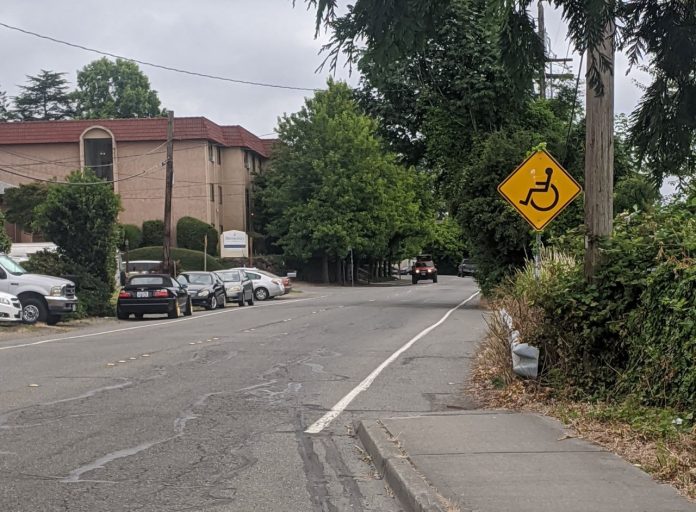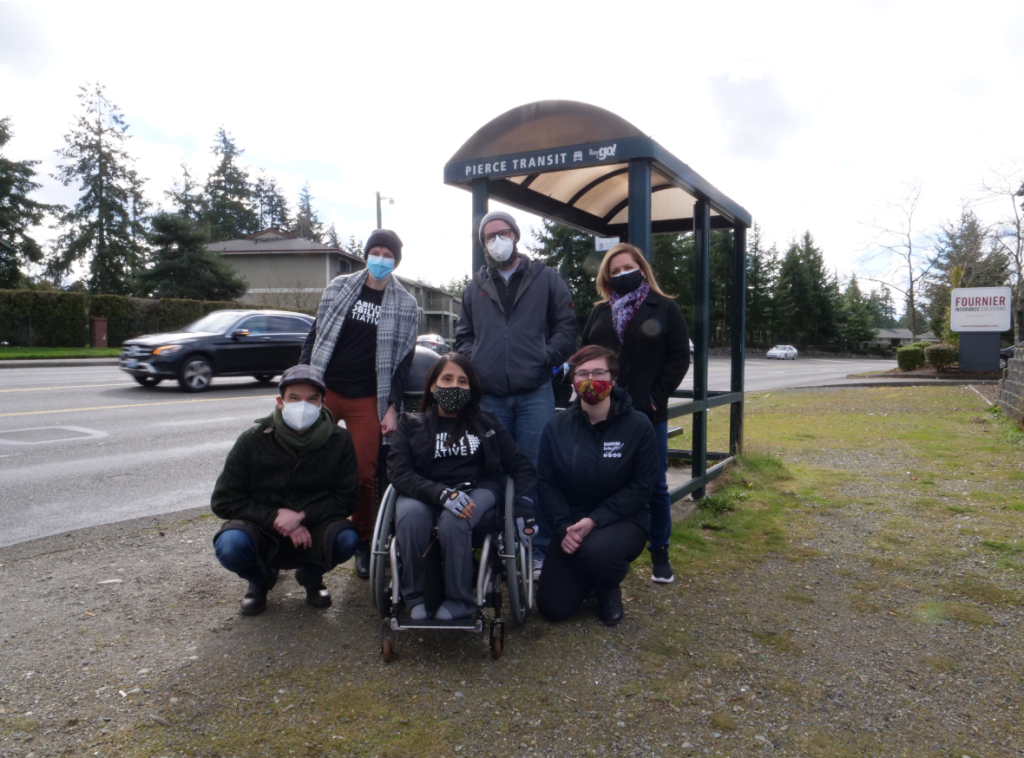For Cody Shane, getting out of Chewelah can be a challenge. While he can bike around his hometown, Cody Shane can’t drive, and the bus that comes to Chewelah only offers one trip a day on weekdays, departing Chewelah at 7:15am and returning at 4:30pm. This really limits the kinds of jobs Cody Shane can apply for, and makes it impossible to meet up with friends after work or on the weekends.
At Disability Rights Washington, access to transportation is consistently listed as a top concern for our constituents like Cody Shane, which is why we launched the Disability Mobility Initiative and are surveying people across our state who can’t or don’t drive. So far, we’ve interviewed more than 100 people across Washington from every legislative district and documented those stories on our #MobilizeWA transportation storymap.
Overwhelmingly, people told us they need our state to invest in reliable transit, and in repairing and building out the sidewalks and safe accessible crossings necessary to access transit and get around our communities.
So when we consider whether to support a new transportation package, we look to the needs our communities identified: Will my bus come more frequently? Will the sidewalk to my bus stop get built? Will they build the curb ramp and accessible pedestrian signal I’ve been asking for for a half dozen years? Will this reduce the air pollution from the highway next to my community that’s making us sick?
And as we look at the investments being discussed in this year’s transportation package, the answers seem overwhelmingly to be “no.”
There isn’t direct funding for sustained, fixed-route transit service that many disabled people rely on. There’s no dedicated funding to help local governments comply with the ADA. Policymakers didn’t even bother to quantify the unmet need. We’re providing only a fraction of the funding local governments need to fix pedestrian infrastructure. And cleaner air is not on the horizon, because highway expansion projects are still a bigger priority, adding to our unfunded maintenance backlog, and bringing more cars and pollution to our communities.
So why should we celebrate? Why should we sign off, bought off by a trickle of extra funding for a few more sidewalks, a little bit more funding for “special needs” grants to fund reservation-required services that are mere band-aids to our inaccessible communities and inadequate transit service?
Sure, it’s more than previous packages. But it’s not enough, after decades of failing to invest in transit and accessible communities. And once again it sends the message that we are not enough.
This is a message we hear both indirectly and directly from the legislature. In a recent hearing, Senator Ann Rivers used the “R” word. More concerning was that no other committee member said anything at the time to call out her unacceptable and offensive comment. Paternalism and condescension toward disabled people is deeply ingrained in Olympia, especially among a generation of folks who grew up when disability was seen as something to be ashamed of, and disabled people were supposed to be hidden away in institutions. It’s no wonder they see our needs as “special,” as somehow different and less important than the needs of everyone else. Legislators will join hands across the aisle to fund “special needs” transit service, but not the fixed-route transit service many disabled people would prefer, nor the sidewalks to get there.
Accessible pedestrian infrastructure that connects to reliable transit can mean the difference between access and isolation. Lilly is a young, disabled woman who lives in Federal Way, in King County, but most of her friends and her doctor appointments are in Tacoma. She wishes she could get on the fixed-route bus to go places, but there aren’t sidewalks where she lives, so she has to use paratransit. And because she’s crossing county lines, she has to make those paratransit requests three days in advance. The reality of this is that she misses out on a lot of opportunities, and instead is stuck at home, feeling lonely and depressed.
It is absurd that well-developed, suburban areas like Federal Way, just like so many communities in our state, still lack accessible places for people to walk and roll. A transportation package that doesn’t substantially address basic access needs is unacceptable.
Under the Biden Administration, the Department of Transportation, led by Secretary Pete Buttigieg, is urging us to build the infrastructure that supports transportation modes beyond cars. National advocacy groups like T4America are arguing that it’s better to have no new infrastructure spending than infrastructure spending that continues to burden our country with highways we can’t afford, don’t need, and that actively perpetuate harm, especially in Black, Indigenous and people of color (BIPOC) and poor communities.
Now is not the time to lock our state into another sixteen years of antiquated and failing transportation policy through a transportation package that fails to address the mobility access needs of all Washingtonians.

Anna Zivarts
Anna Zivarts is a low-vision parent, nondriver and author of When Driving Is Not an Option: Steering Away from Car Dependency (Island Press, 2024). Anna launched the Week Without Driving challenge and directs the Disability Mobility Initiative at Disability Rights Washington, where she organizes to bring the voices of nondrivers to the planning and policy-making tables. Anna sits on the board of the League of American Bicyclists and serves as a member of the Transportation Research Board’s Committee on Public Health and Transportation.



